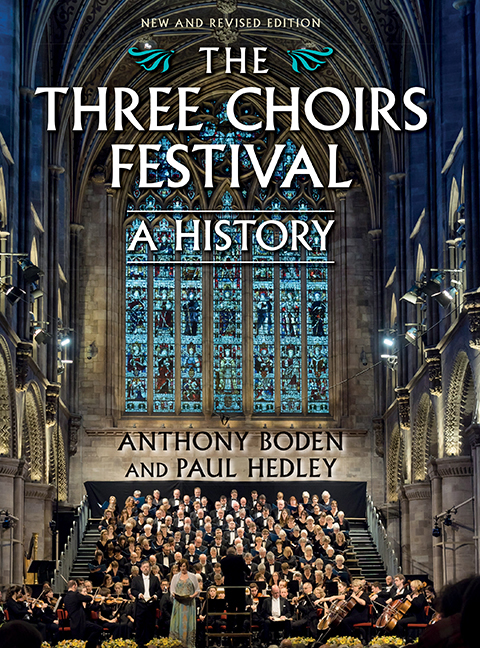Book contents
- Frontmatter
- Contents
- List of Illustrations
- Preface
- Acknowledgements
- List of Abbreviations
- List of Cathedral Organists
- 1 Origins
- 2 A Fortuitous and Friendly Proposal
- 3 A Numerous Appearance of Gentry
- 4 ‘The Musick of my Admiration Handel’
- 5 The Gentlemen and the Players
- 6 Avoiding Shipwreck
- 7 Prima voce
- 8 Favourites and Flops
- 9 Sacred and Profane
- 10 Froissart
- 11 The Unreasonable Man
- 12 The Dream
- 13 Beyond these Voices
- 14 An Essentially English Institution
- 15 The Elgar Festivals
- 16 Dona nobis pacem
- 17 Recovery
- 18 Association
- 19 A New Epoch
- 20 Jubilee
- 21 Theme with Variations
- 22 Houses of the Mind
- 23 ‘A Gold-Plated Orchestra’
- 24 A New Millennium
- 25 Reorganisation
- 26 An Invitation to the Palace
- Appendix Three Choirs Festival Timeline
- Select Bibliography
- Index
- Plate section
21 - Theme with Variations
Published online by Cambridge University Press: 11 August 2017
- Frontmatter
- Contents
- List of Illustrations
- Preface
- Acknowledgements
- List of Abbreviations
- List of Cathedral Organists
- 1 Origins
- 2 A Fortuitous and Friendly Proposal
- 3 A Numerous Appearance of Gentry
- 4 ‘The Musick of my Admiration Handel’
- 5 The Gentlemen and the Players
- 6 Avoiding Shipwreck
- 7 Prima voce
- 8 Favourites and Flops
- 9 Sacred and Profane
- 10 Froissart
- 11 The Unreasonable Man
- 12 The Dream
- 13 Beyond these Voices
- 14 An Essentially English Institution
- 15 The Elgar Festivals
- 16 Dona nobis pacem
- 17 Recovery
- 18 Association
- 19 A New Epoch
- 20 Jubilee
- 21 Theme with Variations
- 22 Houses of the Mind
- 23 ‘A Gold-Plated Orchestra’
- 24 A New Millennium
- 25 Reorganisation
- 26 An Invitation to the Palace
- Appendix Three Choirs Festival Timeline
- Select Bibliography
- Index
- Plate section
Summary
THE Monday evening concert at Hereford in 1979 began with a powerful performance of John Ireland's choral cantata These things shall be, and Ireland's song cycle The Land of Lost Content was the central work in a recital by Ian and Jennifer Partridge on Tuesday afternoon, both marking the centenary of the composer's birth. In These things shall be the soloist was Stephen Roberts, accompanied by the CBSO under Donald Hunt, taking over from John Sanders, who had been prevented by illness from appearing at the Festival.
Also on Monday evening, Roy Massey conducted the cantata This Worlde's Joie by William Mathias, with Janet Price, Kenneth Bowen, Stephen Roberts, Robert Green (organ), the choristers of the three cathedrals, the Festival Chorus and the CBSO. Contemporary British music was again well represented in the Tuesday morning recital by the three cathedral choirs: an Easter Sequence by Kenneth Leighton, Two Carols by Richard Rodney Bennett, and Geoffrey Burgon's At the Round Earth's Imagin'd Corners.
Donald Hunt beckoned the Festival to France on Monday evening, conducting Poulenc's last major work, Sept Répons des ténebres. The soloist was Honor Sheppard, who also sang in the symphonic poem King David by the French-born Swiss composer Arthur Honegger, joining Margaret Cable and David Johnston, the Festival Chorus and CBSO under Roy Massey. The part of the Witch of Endor was taken by Elizabeth Evans, and the performance was further distinguished by the familiar voice of the popular broadcaster Richard Baker as the Narrator.
Of greater rarity was Hymnus Amoris by Carl Nielsen, given on Thursday evening by Julie Kennard, admirable in her first Three Choirs appearance, Brian Burrows, Stephen Roberts, David Thomas, the Festival Chorus and RPO conducted by Roy Massey. This was followed by the premiere of John Joubert's Herefordshire Canticles, a Festival commission repeated at Hereford in 1991 with the same soloists – Julie Kennard and Stephen Roberts, and again conducted by Massey.
- Type
- Chapter
- Information
- The Three Choirs Festival: A HistoryNew and Revised Edition, pp. 278 - 300Publisher: Boydell & BrewerPrint publication year: 2017

